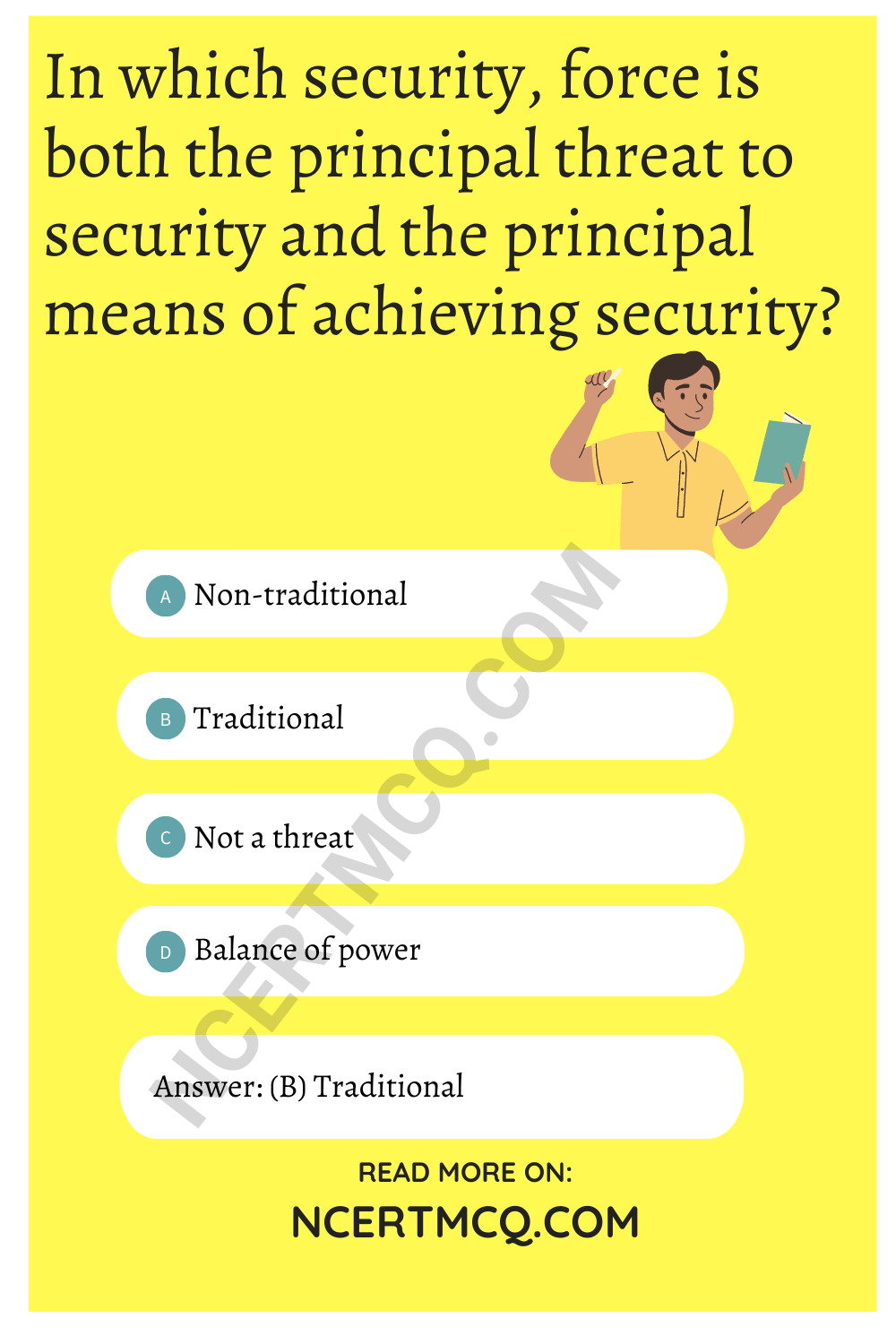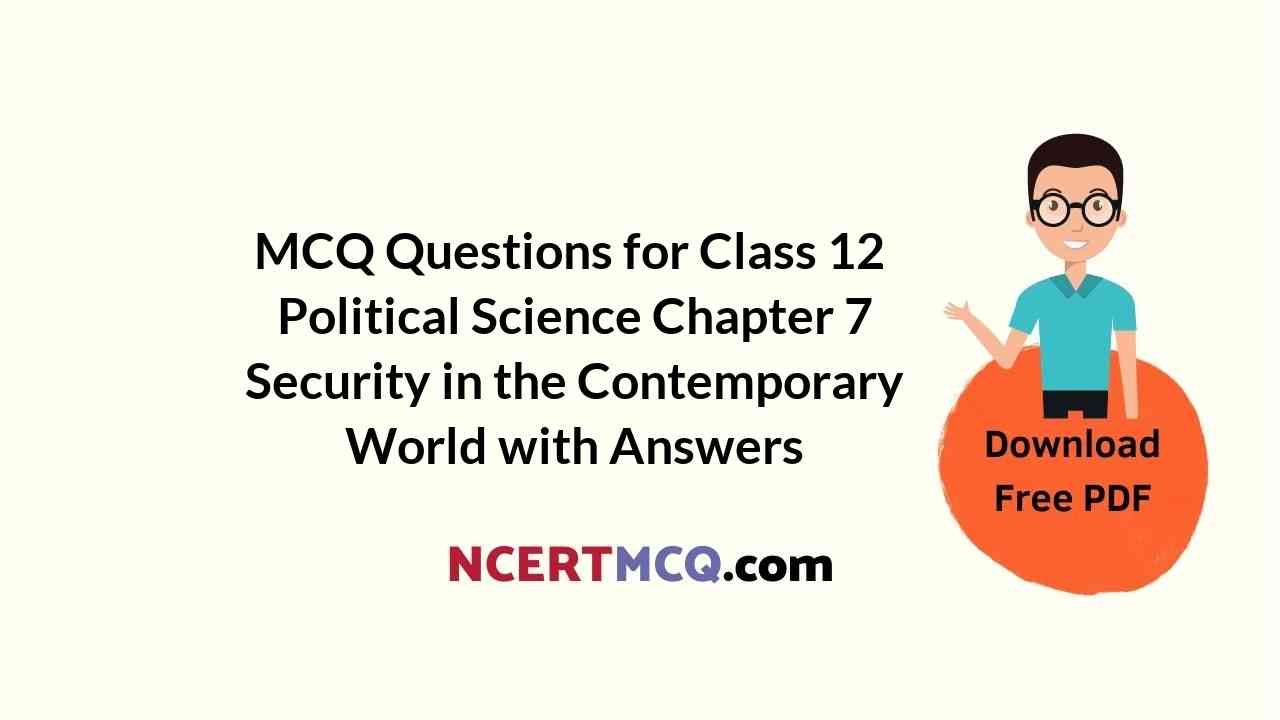Check the below NCERT MCQ Questions for Class 12 Political Science Chapter 7 Security in the Contemporary World with Answers Pdf free download. MCQ Questions for Class 12 Political Science with Answers were prepared based on the latest exam pattern. We have provided Security in the Contemporary World Class 12 Political Science MCQs Questions with Answers to help students understand the concept very well.
Class 12 Political Science Chapter 7 Security in the Contemporary World MCQ With Answers
Political Science Class 12 Chapter 7 MCQs On Security in the Contemporary World
MCQ Questions For Class 12 Political Science Chapter 7 Question 1.
Which of the following is a source of insecurity?
(a) Human Rights
(b) Balance of Power
(c) Global Poverty
(d) Alliance Building
Answer
Answer: (c) Global Poverty
Question 2.
Which of the following is a component of traditional security?
(a) Alliance building
(b) Preventing war
(c) Balance of power
(d) All of these
Answer
Answer: (c) Balance of power
Question 3.
How many States acceded to Chemical Weapons Conventions?
(a) 102
(b) 155
(c) 192
(d) 181
Answer
Answer: (d) 181
Question 4.
In which security, force is both the principal threat to security and the principal means of achieving security?
(a) Non-traditional
(b) Traditional
(c) Not a threat
(d) Balance of power
Answer
Answer: (b) Traditional

Question 5.
Match the terms with their meaning:
| I. Confidence Building Measures (CBMs) | (a) Giving up certain types of weapons |
| II. Arms Control | (b) A process of exchanging information on defence matters between nations on a regular basis |
| III. Alliance | (c) A coalition of nations meant to deter or defend against military attacks |
| IV. Disarmament | (d) Regulates the acquisition or development of weapons |
Answer
Answer:
| I. Confidence Building Measures (CBMs) | (b) A process of exchanging information on defence matters between nations on a regular basis |
| II. Arms Control | (d) Regulates the acquisition or development of weapons |
| III. Alliance | (c) A coalition of nations meant to deter or defend against military attacks |
| IV. Disarmament | (a) Giving up certain types of weapons |
Question 6.
Write one international convention passed by the United Nations to eliminate terrorism.
Answer
Answer: The U.N. Convention for the suppression of unlawful seizure of Aircraft (1970).
Question 7.
In which year Global Security has emerged?
Answer
Answer: Global Security emerged in 1990.
Question 8.
Write one component of Traditional Security Policy.
Answer
Answer: Balance of power is an important component of Traditional Security Policy.
Question 9.
What is the basis of Alliance?
Answer
Answer: Alliances are based on national interests and can change when interests change.
Question 10.
Give one example of Arms Control.
Answer
Answer: Strategic Arms Limitation Treaty II or SALT II.
Question 11.
When Non-Proliferation Treaty was signed?
Answer
Answer: 1968
Question 12.
Write one component of India’s Security Strategy.
Answer
Answer: Strengthening its military capabilities because India has been involved in conflicts with neighbours.
Question 13.
In which year India first tested a nuclear device?
Answer
Answer: 1974
Question 14.
In your view, do the terrorists have any value for human rights and democratic means.
Answer
Answer: The terrorists have no value for human rights and democratic means. They believe in the cult of bombs and violence.
We hope the given NCERT MCQ Questions for Class 12 Political Science Chapter 7 Security in the Contemporary World with Answers Pdf free download will help you. If you have any queries regarding CBSE Class 12 Political Science Security in the Contemporary World MCQs Multiple Choice Questions with Answers, drop a comment below and we will get back to you soon.
Class 12 Political Science with Answers MCQ:
- The Cold War Era Class 12 MCQ
- The End of Bipolarity Class 12 MCQ
- US Hegemony in World Politics Class 12 MCQ
- Alternative Centres of Power Class 12 MCQ
- Contemporary South Asia Class 12 MCQ
- International Organisations Class 12 MCQ
- Security in the Contemporary World Class 12 MCQ
- Environment and Natural Resources Class 12 MCQ
- Globalisation Class 12 MCQ
